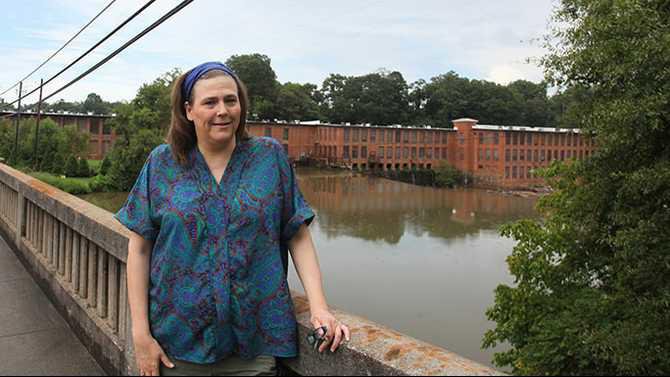Gayle Friedman lives less than 10 miles from a dialysis clinic where she should be receiving life-saving treatment three times a week.
Instead, Friedman, who is disabled and cannot drive, spends her days at home with only her parrots for company as her kidneys slowly shut down. Friedman lives in Porterdale with her brother, who works long hours and cannot commit to the strict regimen of weekday appointments.
“I feel like I’m dying in my house,” Friedman says. “I just don’t have any way to get there consistently.”
Friedman is one of an estimated 3.6 million Americans who delay or miss medical care because of transportation issues. Many, like Friedman, live on a fixed income in a rural area with no public transportation.
Her case also offers a window into a safety net of programs—including worker’s compensation insurance, Medicare, and Medicaid—that contains gaping holes.
Her story begins nearly 20 years ago when Friedman, then in her mid-twenties, moved from California to Newton County to start a poultry farm and plant nursery with her brother. As they sought to get the business up and running, Friedman took a job at Ingles supermarket.
One day, as she was bending down to help a customer, another angry customer rammed Friedman with her cart. Years and several surgeries later, her right shoulder is all but useless. An unrelated injury to her right foot led to infection, sepsis and kidney failure, resulting in a prolonged hospital and nursing home stay that left her buried under a mountain of debt.
Unable to contribute to the intense physical labor needed to keep the poultry farm going, Friedman and her brother eventually lost the business and their investment with it. With time, her condition and finances forced her to stop the volunteer work she loved and which was her connection to the outside world.
“I was volunteering at hospice quite a bit and they had a position open and they said I could have had it but they didn’t want the liability of this injury, and if my shoulder dislocates and I can’t get it back in right away I pass out, and then I have head injuries,” says Friedman. “You’re not real employable in that state, if you spend more time on the floor and people calling an ambulance for you, and that was happening all the time.”
These days, Friedman, now 45, is homebound, sleeping and sitting in the same chair for hours on end, isolated from the community. She can only walk for short distances and often uses a wheelchair.
Friedman continues to receive payments of $86.95 a week from Ingles’ worker’s comp insurance, which also covers medical issues related to her shoulder. Her case has been classified as “catastrophic,” meaning that she is gravely and permanently disabled.
In addition, she receives $719 a month through the Social Security Disability Insurance program. Medicare covers a large percentage of her medical care not covered by worker’s comp, but does not offer non-emergency medical transportation to appointments.
With a fixed income of $1,066 a month, Friedman is barely able to pay for her basic living expenses, let alone the hundreds of dollars in copay for dialysis and transportation to get there (one cab company offered her a “reduced” rate of $400 a month).
Newton County is not one of the 112 counties in Georgia that operate rural public transportation programs.
While Friedman’s income is paltry compared to her medical expenses, it appears to be too high for her to qualify for any supplemental support from Medicaid as a Qualified Medicare Beneficiary. Even then, QMB would only cover Friedman’s share of her medical care costs, but not non-emergency medical transportation, which is only offered to beneficiaries fully covered under Medicaid.
“They say, ‘You can’t get more money for another injury’,” says Friedman, who has applied and been declined for Medicaid coverage numerous times. “I don’t want more money, more money isn’t the answer; I need transportation services.”
Friedman remains uncertain why she has been denied Medicaid coverage. She applied again several months ago, but has not received a response and does not have regular internet access to check on the status of her application.
The support Friedman does have can be erratic. She said her worker’s comp insurance threatens not to cover certain treatments, or simply stops sending checks, sending Friedman jumping through hoops to get the payments she is due.
“They just make life difficult,” says Friedman. “Worker’s comp, they have to cover these things by law, but if they can find a way out, they do.”
Ingles, which appears to operate a self-insured worker’s compensation insurance program, did not respond to a request for comment.
At the moment, Friedman’s primary concern is transportation. She thinks she could drive a modified vehicle, but doesn’t know how she could afford one. Her birds are her sole consolation, and the only small luxury she affords herself.
“It doesn’t sound like a big deal, but they’ve kept me going,” says Friedman. “That’s my social life, my parrots.”
Friedman has started a GoFundMe campaign with the help of a friend to cover the cost of transportation to dialysis.
“I have a lot to give, but I have no way to give back,” she says. “If I could take care of myself, I know that I have something to offer.”
Friedman’s campaign can be found at www.gofundme.com/5wg8szmew





